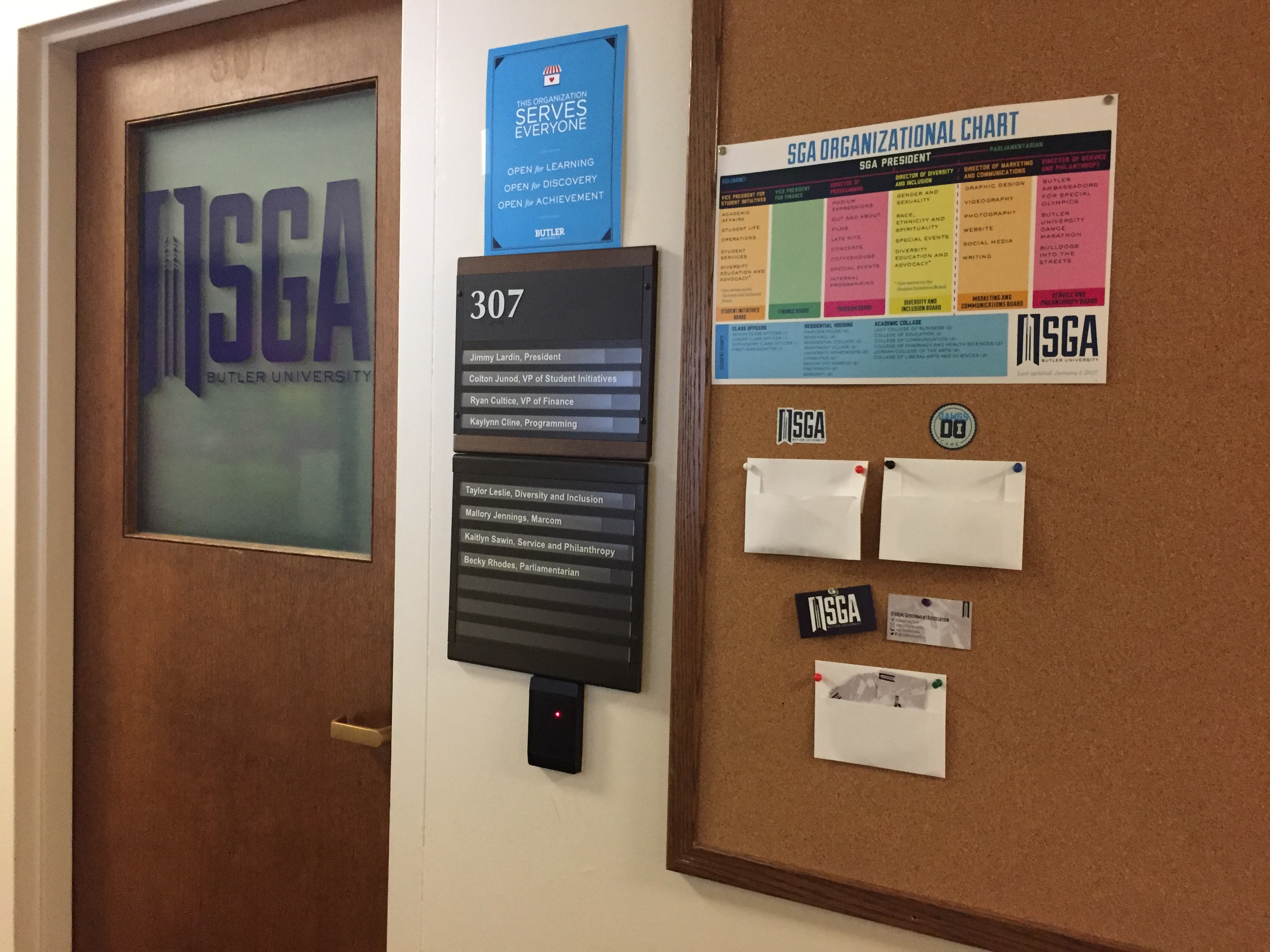The SGA office is on the third floor of Atherton Union. Photo by Jessica Lee.
ALI HANSON | STAFF REPORTER | amhanson@butler.edu
Student Government Association has recently been trying to fill vacant spots in Student Senate. SGA President Jimmy Lardin and parliamentarian Becky Rhodes are conducting interviews for interested applicants. The interview process to fill any vacancies is laid out in the SGA constitution.
“We try to make sure that every senate seat is filled so that every constituency is properly represented,” Rhodes said.
The Collegian reported there has been an issue with Student Senate receiving interested applicants. Multiple senate positions only have one or two candidates to choose from and there is an issue with voting.
Rhodes said each interview typically lasts around 15 minutes, and most of the questions come from the application that are on SGA’s website. Questions on the application regard motivations for applying, plans and goals the applicant may have while serving in this position, and an area in which SGA could improve.
Rhodes said they add in questions during the interview such as, “What is a critique that your employer would have of you?”
The interview is not the only deciding factor on who will become a senator. After the interviews, Lardin and Rhodes will decide on who would be the best fit for the position. Then, Lardin brings the applicant forward during the meeting. The Senate then votes on whether or not this person would be a good fit.
Joe Killion, sophomore international studies and political science major, is a Senate member.
He said the applicant is present at the meeting while Lardin speaks to the various qualities they can bring to the Senate. A slide presents details on their campus involvement, qualities and qualifications. After that information is given, the Senate has the opportunity to raise their hands in favor of accepting the applicant.
“We appoint them after Jimmy recommends them to us, but it is the power of the president to bring the recommendation to the Senate,” Killion said.
The SGA had their first meeting on Sept. 14. Lardin and Rhodes brought forward two campus applicants and one sorority applicant, all of whom the Senate voted in favor. Sept. 27, Senate approved of a new College of Communication senator and a Jordan College of the Arts senator. Currently, three seats are open.
“It’s not really a vote,” Killion said. “It’s kind of more an acknowledgement, I would say.”
Senior English major Jillian Wanbaugh expressed concerns about the democracy of the process.
“It’s a student body government, so, by any democratic definition, the student body should have a say as to who is representing them,” Jillian said. “If the representatives are just chosen by a small number of people, it is basically eliminating the space for public opinion.”
Student Senate works as a link between the student body and the administration. Senators talk directly with the students to understand concerns on campus and then bring it forward to the meetings to discuss it.
Jesse Neader, assistant director for PuLSE, experiences his first year with the SGA.
“Students elect the representative,” he said. “We entrust the representative to vote in their best interest, and, therefore, when someone is appointed through Jimmy, it goes in front of the Senate to be confirmed. The representatives confirming them are doing that in the best interest of their constituency.”
Neader mentioned that he was not confident that representatives are always voted in based on their merit alone. He said he hopes if an unqualified person was brought before the Senate, the members would not vote them in.
“That’s the hope — that the student body is going to elect stewards of their voice,” Neader said.
Killion said the voting-in process is quick and easy. No one has voted against the applicant brought forward by Lardin.
“I don’t even know what would happen if the Senate rejected someone,” Killion said. “I just don’t see it happening.”
Wanbaugh mentioned the idea of having a second election to decide on the remaining vacancies.
Neader said creating a second election is difficult because of technical issues. SGA had technical issues this fall and had to push the election back a day.
First-year anthropology major Michaela Ivory was neutral on the subject of interviews.
“I honestly think they should do whatever they need to do to fill those up as quickly as possible, so SGA can run smoothly this year,” Ivory said.
She was unaware of the election until the day of and was uninformed about the whole situation.
Neader suggested the idea for a specific annual date for Butler elections. Having consistency could alert students and pique their interest in the election. Ivory had positive comments about this idea.
“I think it would be really beneficial to propose a Butler election day,” Ivory said. “If we got into a habit of making that an actual day, I think it would do a bit to increase awareness among the student body of SGA election.”
Neader said that even with promotion and advertisement of the elections, there is still a large amount of the student population that does not vote.
“We don’t have a large voter turnout except in the spring for the SGA presidential election,” he said. “So, even then, the full representation of the student body is not represented in that case.”
Senate applications will remain open until the vacancies are filled. Three spots remain open for interested applicants.



